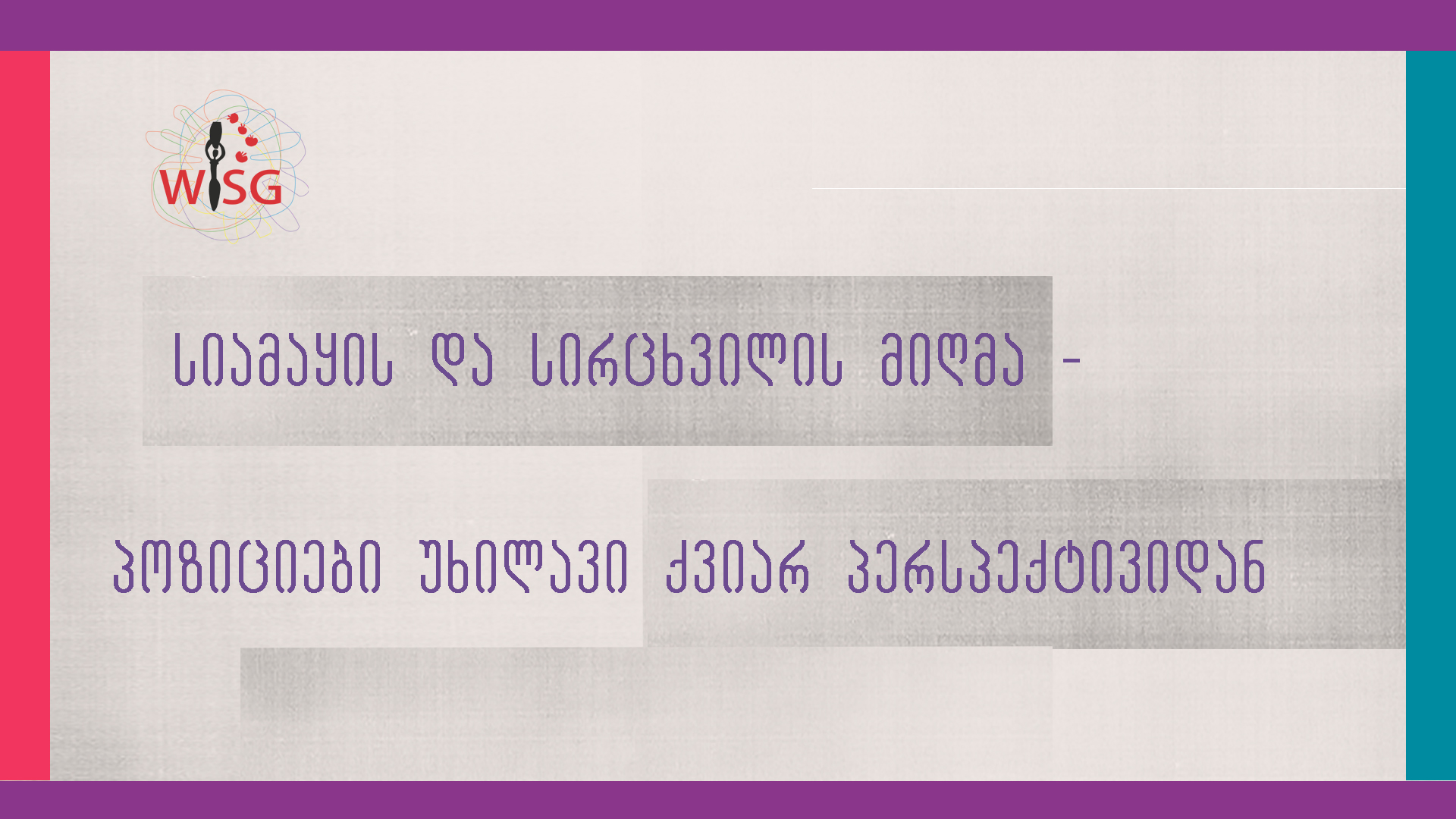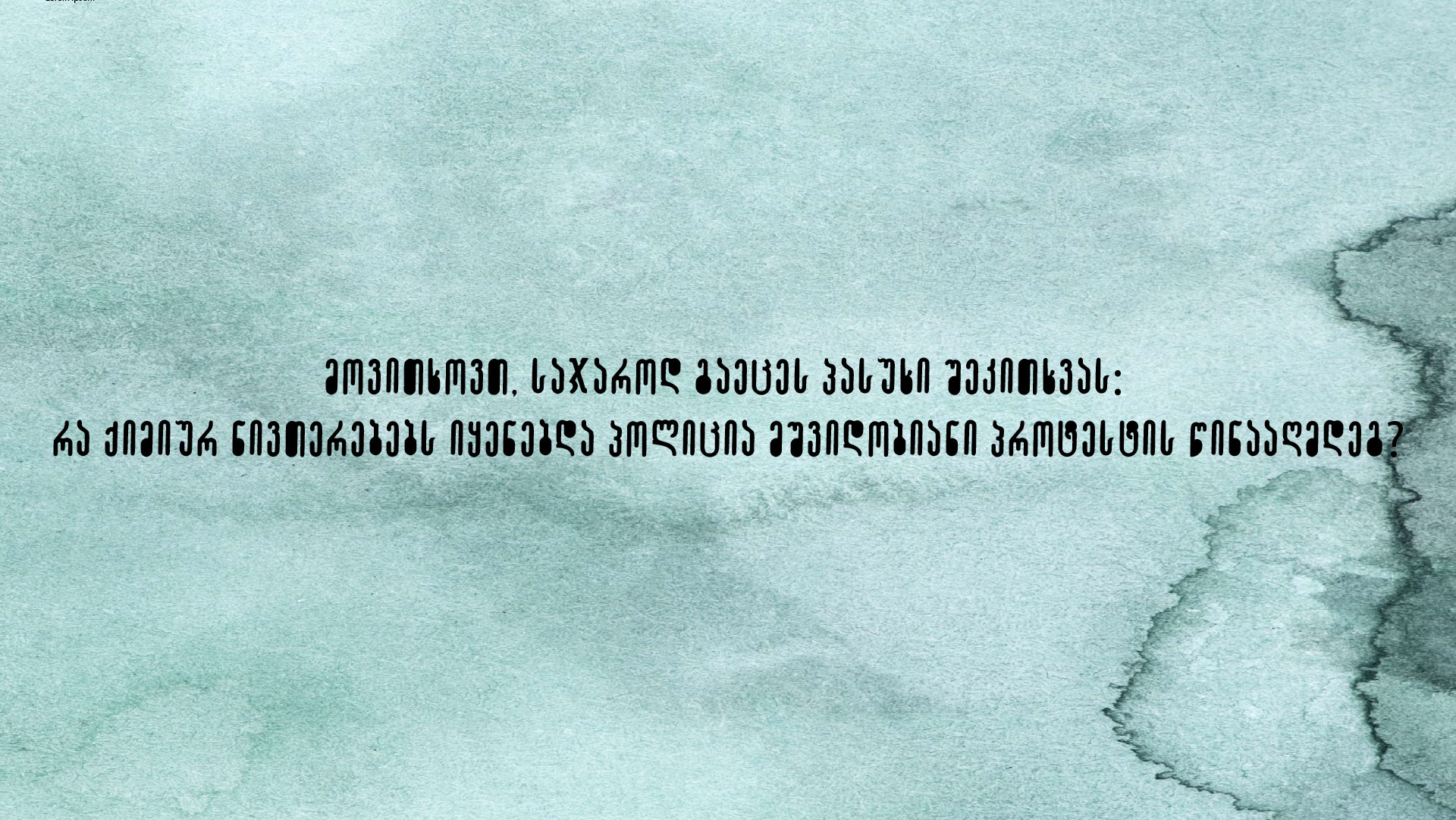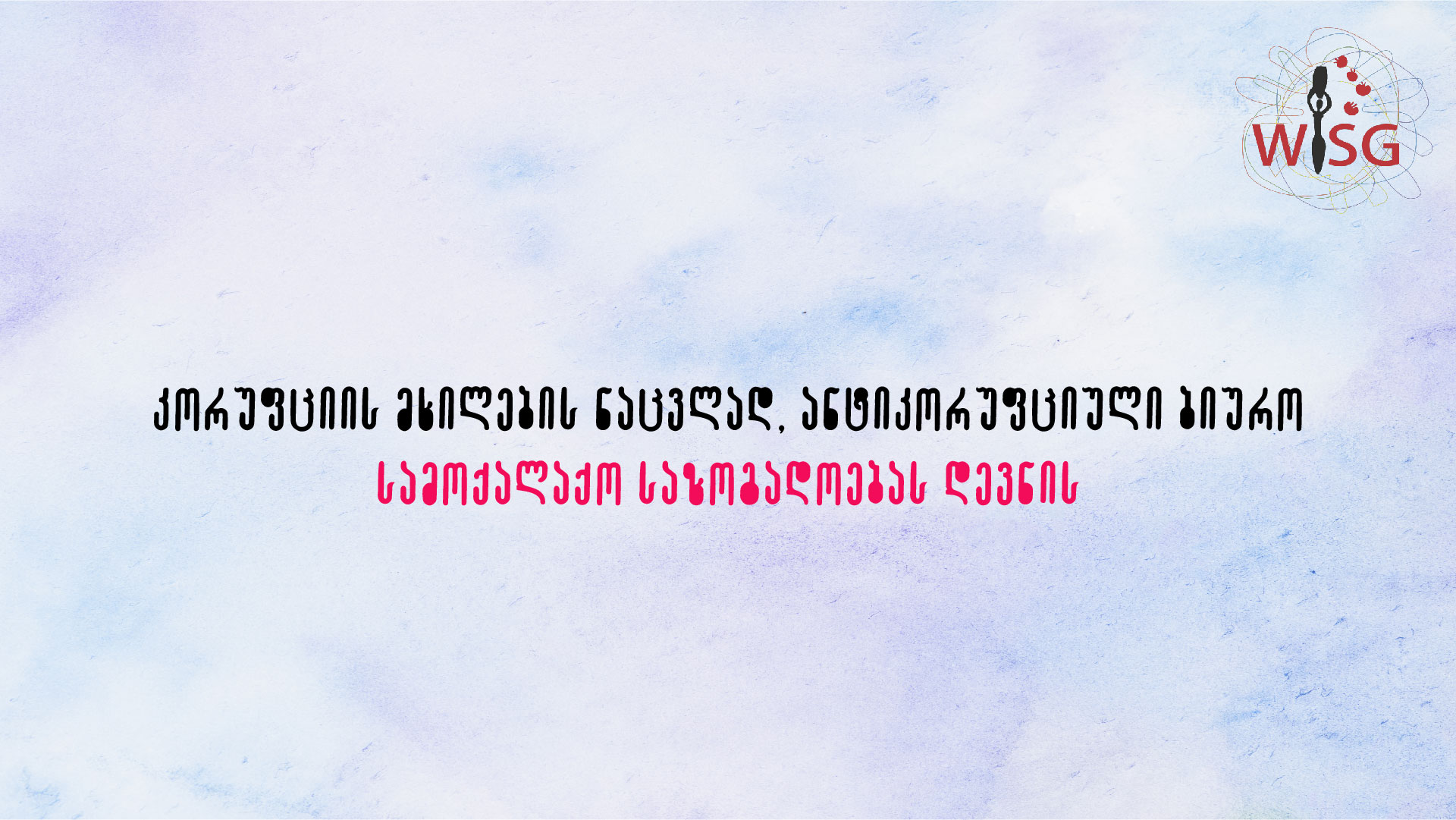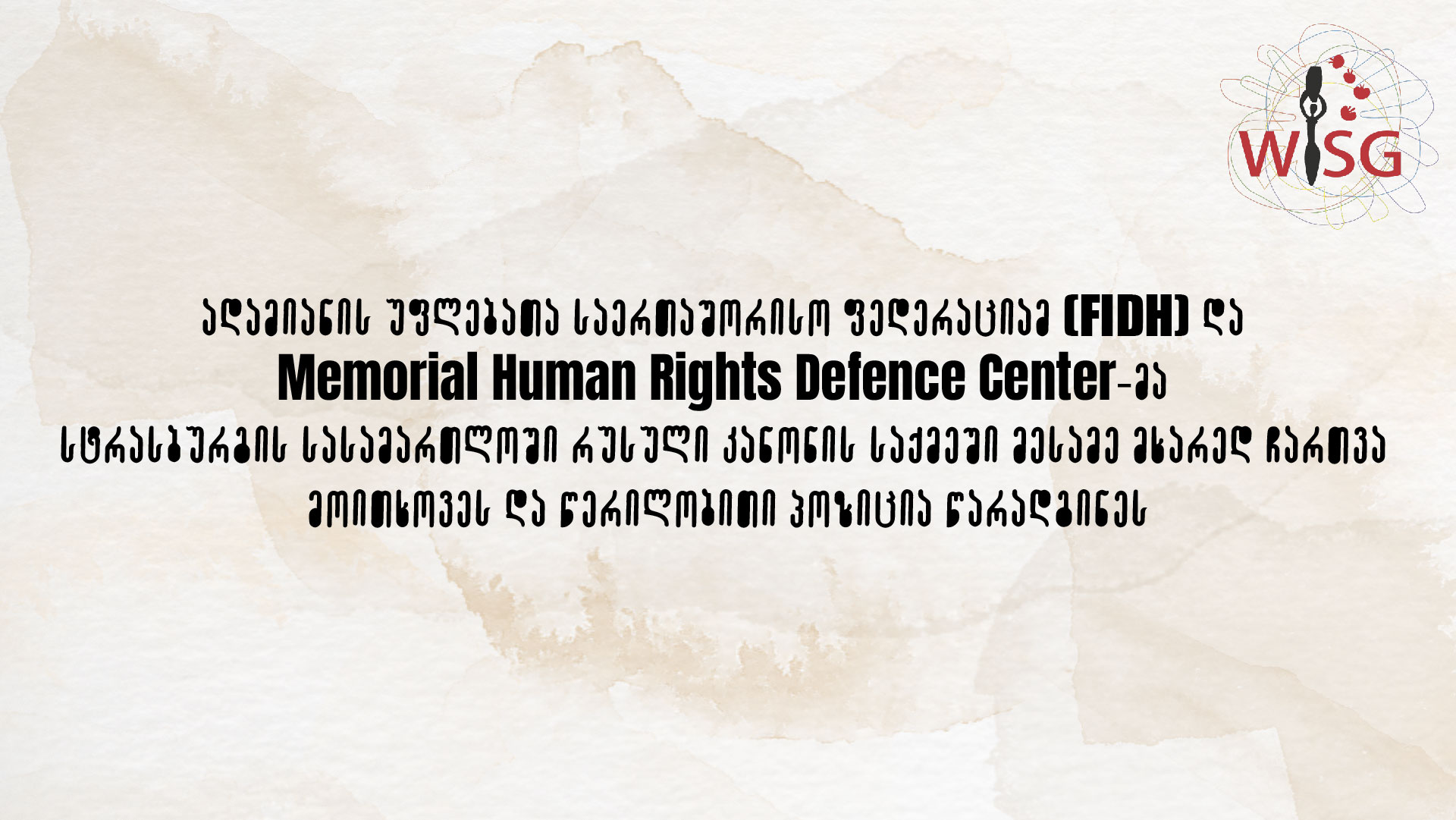- Introduction
"Women's Initiatives Support Group" (WISG) considers it important to respond to the developments around the March for Dignity. Our reflection is based on the critical feminist analysis and is rooted in our personal experience, as well as that of the queer organizations and community members.
We are deliberately publishing this text now when the expected and unexpected results of the last month’s events are clearly visible, so that, in a regime of constant informational exaltation aimed at the radicalization of public opinion, our position does not remain the subject of impulsive and affective discussions.
Together with Tbilisi Pride, up to 20 other organizations participated in the organizing of March for Dignity planned within the frames of a Pride week. The event was campaigned for by up to 15 opposition parties. Large private media outlets mobilized to cover the march, while the ultra-right channel Alt-Info and other radical groups used their broadcasts and social media to call for a violent attack.[1]
On the 5th of July, the state did nothing to prevent the announced violence, moreover, the Prime Minister, who appeared to express the will of an imaginary homophobic majority, took advantage of the open cooperation between Tbilisi Pride and the opposition parties and labeled the issue of queer people’s assembly in public spaces as the political opposition’s attempt to create chaos.[2] On the other side of the polarity, the main protagonists were political party and mass-media leaders positioning as supporters of Pride. The issue of homophobia, however, soon disappeared from their protest messages. The queer community has continued to be a symbolic backdrop for the new political escalation and public polarization defined by the powerful groups.
- Occupying the public space: Overview of the experience so far
Issues related to sexual orientation and gender identity have long been the subject of speculation by politicians, the Patriarchate of the Georgian Orthodox Church, the media, and in recent years, even some queer activists themselves. Conservatives portray queer people as a threat to national identity, while liberal groups use them as a symbolic attribute to delineate their own pro-Westernness. As a result, discussion about homophobia as a systemic and structural social problem is almost absent from their agenda. This discourse ignores the daily challenges of the queer community, stifles the voice of the community members, and excludes them from public life. Therefore, in analyzing the current events, it is important to take a critical look at the queer community’s historical experience of occupying public space in Georgia, situated in this intentional polarization logic.
It should be noted at the outset that homophobic and transphobic rallies against gay Pride parades in Georgia begin much earlier than queer activism in public space. Back in 2007, based on false information published by the newspaper "Alia", various political and religious groups protested against the imaginary Pride, and in 2010 a large rally was organized by the Patriarchate in Batumi, also against the phantom gay Pride.[3]
Since 2012, groups affiliated with the Patriarchate and specific organizations have been trying to violate the real freedom of assembly of the queer community. On May 17, 2012, a peaceful procession of the queer community was violently attacked by a group organized by the ’’Union of Orthodox Parents’’ and the ’’Brotherhood of St. King Vakhtang Gorgasali’’. In order to stop the violence, the state forcibly evacuated not the perpetrators but members of the queer community. Even then, as in subsequent cases, the protesters had been given a guarantee of security by the government officials.
In 2013, together with the abovementioned groups, the Patriarchate is already directly planning, implementing and loudly inciting violence against the queer community in public space and encouraging persecution of gender non-conforming people in the streets. Calls for violence are heard from high-ranking clerics, with various political parties attributing attempts to assemble the queer community to the political agenda of rival parties, which in turn deprives the community of agency, makes it lose control of the public process and indirectly increases the risk of violence. In parallel with these processes, the post-factum condemnation of this unprecedented violence, expressed by the government officials responsible for ensuring safety and freedom of expression, sounded particularly cynical.
The violent events of 2013 have further increased the number of informal or formal groups that deliberately stir up homophobic and transphobic sentiments in society. Homophobic and misogynistic narratives are an essential part of their agenda and, as a rule, their social and political activism also stands on this narrative, and sometimes is limited to attacking queer and women's issues. These groups are trying to attract the voters [4] by demanding the restriction of the rights of queer people, manifesting homophobia and misogyny. In other words, such a visibility strategy has helped to consolidate and increase the visibility of forces with a homophobic narrative instead of that of the LGBTI community and issues that are relevant to them.
It should be noted that since 2013, the spectrum of political instrumentalization of queer issues has become more diverse, and public actors have begun to present queer issues in the geopolitical context of the "cultural war" even more actively. In addition to what has already been described, political parties begin to integrate sexuality and gender issues into election programs, although, in many cases, this is either highly superficial or in principle inconsistent with the policies pursued by these parties.[5] As a result, the declared positions of these political parties, on the one hand, deliberately demonize queer people as an anti-national, artificially created threat or a central issue of democracy / Westernness, and on the other hand, unjustifiably present it as a culturally and politically homogeneous group. Introduced by conservative and liberal groups, this narrative pits the public interests of queer people against the universal interests, as it emphasizes its exclusivity.
Such instrumentalization of issues related to sexual orientation and gender identity is used to perpetuate and reproduce social conflict in order to keep the whole society in constant crisis. As a result, we see how easily different powerful groups are able to overshadow the immediate social and economic needs of the society, including the LGBTQI community, suppress all social protest,[6] including that organized[7] around the problems facing the queer community.
3. Instrumentalization of visibility, politics of perpetual crisis and alternative strategies
The agenda and action plan of WISG as a feminist community organization is based on community needs assessment, identifying systemic and structural causes of homo / bi / transphobia and overcoming them through consistent political work. We work with empirical, real data[8] on issues related to the queer community and apply political, legal, economic, social and cultural context analysis. At the same time, along with other key areas,[9] an important part of our work is to promote the visibility of the queer community.
In this context, we consider the Women's Initiative Support Group (WISG) visibility strategy as one of the tools to improve the situation of the community and pursue a queer politics. These politics and strategies are created and transformed through ongoing monitoring, study and analysis of the context and the state of the queer community. In practice, this includes an intersectional approach, expanding the scope of cooperation with experts, organizations and initiative groups working on various social and economic issues, integrating sexuality and gender issues in the cultural and educational spheres, and intervening in public space in a variety of ways.
It must be said that the realization of the right of assembly and manifestation for the EU Eastern Partnership countries, in the form of Pride, has become a dominant, unified strategy of visibility and a litmus test of democratization on the path of geopolitical orientation. For us, this strategy is the subject of criticism, as it is not based on the analysis of the local context of different countries and neglects and diminishes its importance. From 2018 to the present, groups involved in adapting the abovementioned strategy have deliberately suppressed the voices of queer activists[10] and experts in the field through attacks and political speculation.
Moreover, in its essence, the combative narrative of defeating groups labelled as homophobic that accompanies successful implementation of Pride does not represent a language of queer liberation politics for us. [11] A similar militaristic dichotomy disrupts the process of identifying real indicators of homophobia and transforming public attitudes, and feeds the agenda of the groups holding power.
Based on the described observations, we have repeatedly expressed our position in both public[12] and behind-the-closed-doors formats, although it has not been properly shared by the organizers of the Dignity March or by local and international partners.
4. Cooptation of solidarity and challenges of intersectional cooperation
Unfortunately, the explicit position and open criticism voiced by WISG was interpreted by some local and international partners as competition, attempt to suppress someone else's initiative, "irrational action of traumatized women," lack of solidarity and betrayal of the idea of community unity. Similar interpretations were used to delegitimize the position of the queer community organizations and activists. In contrast, already in 2021, the idea of solidarity was imitated and co-opted by the marketing campaigns and political instrumentalization of the groups involved in supporting Pride.
Real solidarity, based on the understanding of common socio-economic and ecological needs, human cooperation and mutual assistance, is difficult to achieve in our society today. Under the neoliberal system, it is not possible to form a large-scale social movement between groups working on individual issues, to see women’s and the queer perspective from an intersectional point of view in the fight against common oppression, and to develop a unified strategy.[13] It has become particularly tendent for self-identified left-wing groups to express sexist and homo / bi / transphobic attitudes through superficial and counterproductive criticism of the NGO sector, undervaluing and dehumanizing the efforts of working people in queer community-based and feminist organizations.
Against the background of pseudo-solidarity campaigns, we see how political, religious and financial power groups unite and work purposefully in an unprecedented way whenever the system that produces inequality and injustice is threatened by initiatives aimed at creating potential social connection and based on real solidarity.
5. Conclusion
The scale of organizing and mobilizing of the homophobic groups against the March for Dignity as well as violence they perpetrated was truly unimaginable. We are still reaping the tragic consequences of state indifference and inaction in the form of increased homophobic and misogynistic crimes and murders to this day. The given context, in the light of the already deepening pre-election political and social crises, threatens, first of all, women, queer people and, in general, civil peace in the country. Instead of adequately responding to mass violence by organized groups, shifting the burden of responsibility to peaceful protesters, journalists, or activists affiliated with political opponents as "groups provoking the violence" clearly demonstrates that in using this issue as a political instrument, not only the questions relevant specifically to the queer community, but even people’s health and life are put in the lowest place on the State’s priority list.
Material and political resources in our country today are catastrophically disproportionately distributed and predominantly mobilized in the hands of groups whose interest in gaining power or maintaining their own legitimacy is only conducive to deepening social inequality and producing controversy and crisis. In this context, we believe that organizations and initiative groups working on community, socio-economic and environmental justice issues have a special responsibility to find effective ways to work together to break the logic of polarizing politics, to contribute to the creation of fair and equitable co-existence and support the formation of alternative political movements.
[1] Organizing „July 5th“ / Publika: https://www.facebook.com/watch/?v=2693540917616640
[2] Community-based LGBTQI organizations respond to the statement made by the Prime Minister of Georgia: https://wisg.org/en/news/detail/337
[3] Anti-Gay parades and snatched public spaces: https://youtu.be/RxKiFQlEd8o
[4] Christian-democratic movement gathers signatures to introduce a definition of traditional marriage into constitution: https://www.youtube.com/watch?v=Js3oU5kvQE4, Deputy Minister of Diaspora and chairman of the ’’Erovnulebi’’ (pro-nationals) movement Sandro Bregadze opposes the same-sex marriage in Georgia: https://t.ly/7iv0, ’’Georgian Dream’’ promises the voters to limit the marriage equality, wins elections and implements the relevant constitutional amendment: https://old.civil.ge/geo/article.php?id=28016
[5] For example, 15 political parties signed an agreement to guarantee the protection of rights and equality of LGBTQI people and promised the organization ’’ Tbilisi Pride’’ to protect the rights of the community, even though this would be their direct responsibility in case of being elected. There is no promise of establishing a legal gender recognition mechanism or creating additional guarantees in relation to education and healthcare. The agreement signed by the political parties has already been achieved through consistent international and national advocacy carried out by queer organizations, and there are already relevant guarantees in the legislation, which the political parties are obliged to implement in any case.
[6] “There is homophobic and xenophobic rhetoric against the foreign investor – Turnava” / Publika: https://publika.ge/aris-homofobiuri-da-qsenofobiuri-ritorika/.
[7] Prevention of homophobia and homophobic violence, services for hate crime response and assistance and protection of survivors, legal gender recognition, trans healthcare, implementation of the anti-discrimination law in order to achieve access to employment, education, healthcare, integrating issues of sexual orientation and gender identity into the higher education programs and many more.
[8] See WISG research “ From Prejudice To Equality: study of societal attitudes, knowledge and information regarding the LGBT community and their rights’’: t.ly/ZwLT
[9] National and international advocacy aimed at improving the mechanisms of protection of LGBTQI people from violence and discrimination, integrating issues of sexual orientation and gender identity into governmental and ministerial/sectoral action plans, providing services of assistance and protection to LGBTQI people and increase the public visibility of needs of queer people
[10] Interview with Nukri Tabidze / Indigo: https://www.facebook.com/522290811259683/videos/320048063151894
[11] “The image of a homophobe’’- Tamar Tskhadadze / WISG: https://www.facebook.com/watch/?v=948060092331307
[12] A special statement by WISG: https://wisg.org/en/news/detail/240
[13] “10 years of queer visibility –towards the collective resistance through analyzing the experience” / WISG: https://wisg.org/ka/news/detail/327







